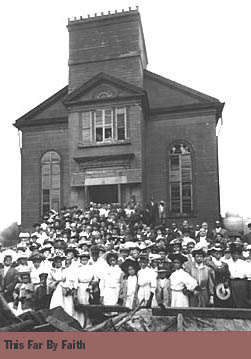
Blackside Inc. falters on Hampton’s last series
Originally published in Current,
Feb. 11, 2002
By Karen Everhart
In a hotel ballroom full of public TV executives last summer, Veva Zimmerman introduced a clip from This Far By Faith, the last major series conceived by her younger brother, the late Henry Hampton, and his production team at Blackside Inc.
 "This
is a story that too many black people take for granted, and a story that
too many whites know nothing about," she said. Zimmerman spoke movingly
of her family's vow to continue and extend Hampton's work, which included
Eyes on the Prize, the landmark PBS series on the civil rights movement.
"This
is a story that too many black people take for granted, and a story that
too many whites know nothing about," she said. Zimmerman spoke movingly
of her family's vow to continue and extend Hampton's work, which included
Eyes on the Prize, the landmark PBS series on the civil rights movement.
But turmoil in Hampton's Boston-based company since his death in 1998 have jeopardized completion of the six-part series on the African-American religious experience as well as the future of the indie production house known for its powerful documentaries about race and social justice in America.
Zimmerman and Judi Hampton, sisters who inherited Blackside, recently down-scaled the company to bare-bones operations and are struggling to pay off debts accrued during production of their brother's last two documentary projects. Hopes on the Horizon, a two-hour documentary on democratic movements in Africa, aired on PBS last February. This Far By Faith, which was to have aired this month, is stalled in postproduction.
The Blackside staff that shared Henry Hampton's standards and vision for documentary filmmaking has disbanded, although June Cross, a talented African-American filmmaker who produced one program in This Far By Faith, is managing completion of the series.
"I've assumed the burden of raising the money and trying to get the series moving again," said Cross, a visiting professor of journalism at Columbia University and former <I>Frontline<I> producer. She is trying to raise $350,000 to pay for rights, finishing and fine-tuning a few episodes, and packaging the series for broadcast.
The Hampton family's Blackside Inc., meanwhile, is responsible for settling past production expenses, Cross said. The company owes back pay and reimbursements to its producers and former staff, rights fees to film archives, and debts to other vendors.
"We want to finish Faith and get Eyes rebroadcast, and that will help to bring in income," said Judi Hampton, the youngest Hampton sibling, who is now president of Blackside. The company does not have enough cash flow, she acknowledged, but she's working to meet its unpaid obligations. "I'm doing the best I can," she said.
An institution gone
It's unclear how much money Blackside owes to creditors, but the company's financial plight is a source of anger and sadness for those who worked for Henry Hampton.
"For me, it is so important that this last series gets aired," said Judy Richardson, a veteran of the civil rights movement who joined the company in 1978. "It really is the last of his legacy." Richardson, a key Blackside figure who was regarded with respect and affection by the staff, was fired in April 1999 when she returned to work while recuperating from major surgery. She insists that her decision to talk publicly about the Blackside's dire situation is "not about me."
"Henry was always talking about speaking truth to power, and he was one of the few black people in public broadcasting that people would listen to," she said. Hampton knew how important it was to establish Blackside as a place where young black and white producers could "do their best work."
"They destroyed something that exists nowhere else at this point," she said. "Blackside as an institution is gone."
Blackside veterans said the company's inheritors didn't appreciate the company's special qualities and how it worked. They didn't grasp the fragile economics of documentary production or attend to the continuous need to develop new projects as others moved through production and broadcast, producers said. Key managers who helped sustain Blackside in Henry Hampton's last years left the company as the sisters opted to pursue revenues from commercial or industrial film production.
"Those of us who had worked there felt they . . . didn't understand what it meant to be working at Blackside," said Terry Rockefeller, executive producer of Hopes on the Horizon and other major Blackside series. It had taken decades to create an institution that nurtured minority producers while creating powerful documentaries on social history. "We didn't want to turn around and start making industrials."
"There is a lot of anger out there--how could you not have anger when you have an organization about which people felt as passionate as they did?" said Judy Crichton, founding executive producer of American Experience. She agreed to serve on a Blackside advisory board convened by Zimmerman, but hasn't been able to participate actively. "I respect the anger but I don't know whether it could have been avoided. You see that kind of anger any time you change a beloved institution."
Trying to make it work
A December feature in the Boston Globe tapped this wellspring of anger to describe Blackside's downward spiral, but Judi Hampton insists that the company is "alive and well."
She acknowledged that she's made mistakes in managing her brother's last project, which has been "a challenge to say the least." But she speaks optimistically about June Cross's work to complete This Far By Faith, and about the company's long-term prospects.
Judi Hampton said her plan for Blackside to produce training videos was not a new direction for the company but an attempt to generate consistent revenues. As a professional development trainer, she saw a way to marry her own expertise with Blackside's story- and issue-driven production techniques. "To me it was a natural blending of my current focus and Blackside's expertise."
Her brother never told her of his intention to leave the company to her and Zimmerman. "My sister and I looked at the films that were in house, and the hard work that people had put in. We talked to funders and tried to make it work and finish the films and carry on the business."
"We never pretended to be filmmakers, and we hired some people who didn't work out," she said, referring to two different executives who were recruited to run Blackside. The search for a filmmaker capable of running the business continues.
"What we want to do is focus on the work and getting each project done, and keeping Blackside going."
As she sees it, her brother's legacy continues with the work of all those who "went through Blackside, the interns, the producers," and others who bring Henry Hampton's sensibilities to their own work. "We're proud of that."
|
Later article Originally published
in Current, Nov. 4, 2002 Those who believe faith conquers all adversity—and those who honor the memory of the late Henry Hampton—will be heartened by the turn of events for the last PBS series initiated by his independent production company, Blackside Inc. This Far By Faith, a six-part documentary on religion in African-American life, survived management turmoil and insolvency at Blackside, the Boston-based company that Hampton founded and ran until his death in 1998. The series explores the connections between faith communities and African-American culture, and examines how religion empowered African-Americans to challenge racial discrimination. June Cross, the producer who raised funds to complete the series after it stalled in postproduction, will deliver it to PBS next month. The network plans to air it next summer. The series had been slated to air in February 2002. After Hampton, producer of Eyes on the Prize and other social histories for PBS, died in 1998, his heirs and longtime associates vowed to finish his last projects. This Far By Faith went into production in 1999 with a fully funded budget. But the production faltered after a series of setbacks at Blackside. The company’s new owners, sisters Veva Zimmerman and Judi Hampton, failed to retain and recruit experienced managers, and dismissed Judy Richardson, Henry Hampton’s longtime associate, described by one colleague as "the conscience and soul" of Blackside. They sold the company’s building in Boston’s South End and moved producers into a new, ill-equipped office midway through production. The team disbanded before the series was finished, and Blackside was mired in debt (story at left). Judi Hampton, president of Blackside, did not respond to requests for an interview. Zimmerman and Hampton severed their relationship with Dante James, executive producer of This Far By Faith, after he challenged their fiscal management of the project. In August 2001 they hired Cross, who had been a senior producer, to raise money and finish the series. Completion funds came from the Ford Foundation, Annie E. Casey Foundation and the CPB/PBS Challenge Fund, said Cross, a visiting professor at Columbia University’s Journalism School. The Independent Television Service is considering another grant application. Cross will end the series with updated material about the African-American faith community’s response to the September 2001 terrorist attacks. Lorraine Toussaint, star of the Lifetime cable series Any Day Now, is narrating the series. The companion book, This Far by Faith: Stories from the African-American Religious Experience, by Juan Williams and Quinton Hosford Dixie, will be published in January. "When building the staff, one of the things I tried to emphasize was that Henry is irreplaceable and what we had to do was to collectively come as close as we could to filling this huge void that he had left," said James in an interview earlier this year. "It wasn’t something that one individual could do, but if we worked hard and remembered all of the Blackside traditions and its approach to making films, maybe we could come close to filling that void. We did the best that we could." |
...
Web page posted Nov.
21, 2002
Current
The newspaper about public television and radio
in the United States
A service of Current Publishing Committee, Takoma Park, Md.
E-mail: web![]() current.org
current.org
301-270-7240
Copyright 2002

